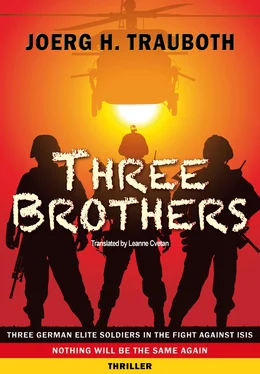1 ...8 9 10 12 13 14 ...18 “If it is our goal to keep the hostages out of mortal danger, and I assume that is our top priority, then we must act immediately,” replies head crisis manager Rudolf Kürten. He is already at the objectives stage, but only he knows that.
What’s that supposed to mean? thinks Bloedorn.
Rudi isn’t ready to reveal his plan just yet. Instead, he employs the process of elimination.
“Since they have made no demands for a ransom, but are rather only attempting political extortion, we see no basis for negotiation.”
“And if we offer a large amount of money? Will they give in?” the chancellor is eager to know.
“The Islamic State has enough money from the gas and oil reserves they have seized, as well as from the support of other friendly states and the plundering of territories they have since lost. We are talking billions.”
“Even if they did need money, we do not pay ransoms,” adds the foreign minister.
We don’t need any further explanations here about that, thinks Henriette and continues: “Of course not. And in this case, we can hardly offer ISIS any developmental aide support like last time.”
The men all lower their heads. Only three of them know the amount of money, which was concealed under a more unspectacular guise as part of the household budget of a different ministry. The German Federal Audit Office carries out regular inspections of the Foreign Office.
“Ok, well, if paying a ransom won’t work, what if we appear to succumb to their political blackmailing?”
“No one will believe us,” intervenes the foreign minister, “and it would only serve to undermine our policy that we are not open to extortion. I really must advise against it, Madam Chancellor. It would also only work just one time, but I doubt that as well. The damage it would do to us internationally would be enormous.”
“What if we employ a high-ranking mediator from another country?” Henriette was thinking of the Emir of Qatar. He is very approachable.
“An interesting option,” Rudi replies, continuing.
“Past experience in the area of executions by means of beheading of western hostages has shown that the jihadists are not interested in any negotiations. They want a public showdown, in which we, the government, are supposed to play the role of the victim. The hostages are only a means to an end.”
The tension hung heavily in the air. Hopefully, she will say the right thing next, Rudi thinks.
And she does.
“I want the hostages out. What feasible options do we have?”
The German Defense Minister, Paul Voss, speaks for the first time. He doesn’t usually say much, but when he does, it always hits the mark. And he looks like he’s coming in for a landing.
He looks at her with a stern face.
“I can see only one viable option in this situation, Madam Chancellor. We must get them out of there OURSELVES – IMMEDIATELY!” He speaks softly and self-assured.
The statement hit like a bomb. Everyone knows that Voss has great influence on the chancellor. She personally appointed the politically independent minister to the department. Certainly, the fact that the mid-fifty-year-old, tall, blonde Voss is the best-looking and best-dressed man in the cabinet had nothing to do with her decision, but rather because he is exactly as unconventional in problem-solving as she is herself. He is without restriction her closest confidante within her inner circle.
“Just how do you envision we ‘get them out of there IMMEDIATELY,’ Mr. Voss?” the chancellor looks to Voss for an answer.
“With the KSK – the Commando Special Forces. The chances are good. We are also not far from the Turkish border and operate therefore outside of NATO territory. The plan is practically already set. If you’d like, Commander of the KSK, Brigadier General Wolf, can fill us in some more.”
The chancellor frowned, somewhat surprised at the preliminary planning within the armed forces.
“Hmm, but why the KSK and not the GSG 9?” she throws in. “They were extremely successful in Mogadishu in 1977, if I remember correctly.”
“We would be glad to take over,” replies Interior Minister Dr. Bauer, “but in this concrete case, the KSK has more experience, both in personnel and in the terrain, which is very similar to that of Afghanistan.”
“We have scrutinized the scenario regarding its plausibility since we first got word of the situation, and the men and equipment have been standing ready in Calw,” adds the brigadier general.
Henriette can already see the protests in parliament. When soldiers press ahead in pre-emptive submission, politicians need to be very careful.
“What is the legal procedure for sending the KSK? Do we need approval from Iraq?”
“For security reasons, we do not have nor want permission from Iraq. A KSK mission in foreign countries without their permission is an obvious breach of international law,” explains Interior Minister Dr. Bauer as he looks over the top of his reading glasses at the chancellor and adds, “but we can deal with that later.”
The German federal foreign minister vehemently waves his head – but remains silent. The chancellor takes this as a sign of his approval.
“Assuming we fulfil our obligation of safeguarding, including all the consequences that entails, does it make any difference legally that the hostages travelled to the war zone voluntarily, despite all warnings, and on their own accord?” she asks.
“No one may be prohibited from undertaking such a trip against their will,” answers Dr. Bauer. “Their decision to take such a trip does not abrogate the government’s obligation for safeguarding.”
These money-hungry businesses, Henriette thinks to herself, risking people’s lives and causing us a lot of political trouble.
“Okay, let’s continue. Does this potential KSK mission in Northern Iraq need to be approved by parliament? If yes, then we can already forget it.”
Her eyes rest on the minister of defense.
“The KSK, just as the Bundeswehr, fundamentally cannot participate in an armed mission on foreign soil without the approval of the German Bundestag. We all know what the Ministerium’s definition of ‘fundamentally’ is, it means that exceptions can be made. And that would be the only way. The only irrefutable exception would be: if there were imminent danger to German citizens. In such a case, parliament is to be consulted as soon as possible.”
“That takes care of that topic. Hopefully! Good, gentlemen, let’s discuss the KSK’s capabilities. What is the KSK allowed to do on the ground and what not?”
Everyone’s eyes turn to the brigadier general. Most of them know that Frank Wolf is very proud of his team, but there are clearly defined limitations for the German elite soldiers during an assignment.
“The KSK is an elite force with special equipment and training, even though it isn’t officially known as such. The Special Forces have no extraordinary operational capabilities legally. Because of this, they are on the exact same level as all the other branches of the military.”
“Can you please translate that, General?”
“It means that we do not have the same freedom of action during missions that, for example, the American, British, or Israeli Special Forces have. We can only shoot in self-defense or if there is threat of imminent danger. Taking direct aim at a suspect with the intent to kill is the usual method our allies employ, but for us, it is strictly forbidden. Suspects must be first taken into custody after some discussion, and in case of doubt, even let free. We cannot turn suspects over to other countries where they would subsequently be faced with execution. KSK soldiers operate in many situations within a blurry legal framework, and that can sometimes create confusion.”
Читать дальше











